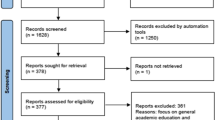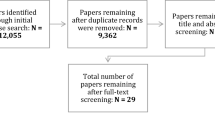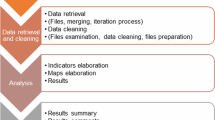Abstract
This paper looks at the conceptual differences between video game learning and traditional classroom and laboratory learning. It explores the notion of virtual experience by comparing a commonly used high school laboratory protocol on DNA extraction with a similar experience provided by a biotechnology themed video game. When considered conceptually, the notion of virtual experience is not limited to those experiences generated by computer aided technology, as with a video game or computer simulation. The notion of virtuality can apply to many real world experiences as well. It is proposed that the medium of the learning experience, be it video game or classroom, is not an important distinction to consider; instead, we should seek to determine what kinds of meaningful experiences apply for both classrooms and video games.



Similar content being viewed by others
References
Anderson C (2004) An update on the effects of playing violent video games. J Adolesc 27:113–122
Anderson CW (2007) Perspectives on science learning. In: Abell S, Lederman N (eds) Handbook of research on science education. Lawrence Erlbaum Associates, Mahwah, pp 3–30
Barab SA, Thomas M, Dodge T, Carteaux R, Tuzun H (2005) Making learning fun: quest Atlantis, a game without guns. Educt Tech Res Dev 53:86–107
Barab SA, Sadler TD, Heiselt C, Hickey DT, Zuiker S (2007) Relating narrative, inquiry, and inscriptions: supporting consequential play. J Sci Educ Technol 16:59–82
Bartholow B, Anderson C (2002) Effects of violent video games on aggressive behavior: potential sex differences. J Exp Soc Psychol 38:283–290
Bosche W (2010) Violent video games prime both aggressive and positive cognitions. J Media Psychol Theor Methods Appl 22:145–150
Bowman R (1982) A Pac-Man theory of motivation: tactical implications for classroom instruction. Educt Technol 22:14–17
Bransford J, Brown A, Cocking R (2000) How people learn: brain, mind, experience and school. National Academy Press, Washington
Gee J (2007) What video games have to teach us about learning and literacy. Palgrave, New York
Gentile D, Lynch P, Linder J, Walsh D (2004) The effects of violent video game habits on adolescent hostility, aggressive behaviors, and school performance. J Adolesc 27:5–22
Kirriemuir J, McFarlane A (2003) Use of computer and video games in the classroom. Retrieved 6 Jan 2012 from http://www.digra.org/dl/db/05150.28025
Lee J, Luchini K, Michael B, Norris C, Soloway E (2004) More than just fun and games: assessing the value of educational video games in the classroom. CHI 04 extended abstracts on Human factors in computing systems. Retrieved 6 Jan 2012 from http://portal.acm.org.libezproxy.open.ac.uk/citation.cfm?id=985921.986068&coll=ACM&dl=ACM&CFID=37600272&CFTOKEN=83674694
Lewis M (2008) Self-conscious emotions. Embarrassment, pride, shame, and guilt. In: Lewis M, Haviland-Jones JM, Feldman Barrett L (eds) Handbook of emotions, 3rd edn. The Guilford Press, New York, pp 742–756
Lunetta V, Hofstein A, Clough M (2007) Learning and teaching in the school science laboratory: an analysis of research, theory, and practice. In: Abell S, Lederman N (eds) Handbook of research on science education. Lawrence Erlbaum Associates, Mahwah, pp 393–441
Prensky M (2001) Digital game-based learning. McGraw-Hill, New York
Rice J (2007) Assessing higher order thinking in video games. J Technol Teach Educ 15:87–100
Shaffer DW (2006a) Epistemic frames for epistemic games. Comput Educ 46:223–234
Shaffer DW (2006b) How computer games help children learn. Palgrave Macmillan, New York
Shaffer DW, Halverson R, Squire KR, Gee JP (2005) Video games and the future of learning. WCER working paper no. 2005-4
Squire K (2003) Video games in education. Int J Intell Simul Gaming 2(1):49–62
Steinberg S (2010) What does ‘video game’ mean, anyway? Cable news network. Retrieved from http://www.cnn.com/gaming.gadgets/archive
Steinkuehler C, Duncan S (2008) Scientific habits of mind in virtual worlds. J Sci Educ Technol 17:530–543
The NPD Group (2009) More Americans play video games than go out to the movies. Retrieved from The NPD Group website: http://www.npd.com/press/releases/press_090520.html
Acknowledgments
This work was supported by a grant (DRL-0833521) from the National Science Foundation.
Author information
Authors and Affiliations
Corresponding author
Rights and permissions
About this article
Cite this article
Barko, T., Sadler, T.D. Practicality in Virtuality: Finding Student Meaning in Video Game Education. J Sci Educ Technol 22, 124–132 (2013). https://doi.org/10.1007/s10956-012-9381-0
Published:
Issue Date:
DOI: https://doi.org/10.1007/s10956-012-9381-0




